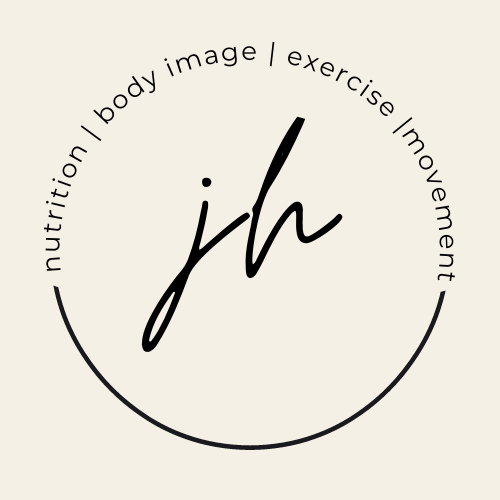Why I Don't Prescribe Weight Loss... To Anyone.
Believe it or not, I didn’t enter this field with the intention of becoming an “anti-diet” dietitian. In fact, I went to school for nutrition because I wanted to find the perfect way of eating in order to help people achieve their weight loss goals, and be the “healthiest” version of themselves.
After 4 years of schooling and a 1-year dietetic internship I started to loosen my grip on the quest for the perfect weight-loss diet, and developed what I would consider a more moderate approach to nutrition and exercise (I’ve never been an extremist). But as I spent more time working one-on-one with clients, I started to recognize patterns of black-and-white thinking and instead of asking myself, why do we have such fraught relationships with food?” I considered that perhaps it was my moderate approach that made it difficult for my clients to reach their weight loss goals.
Maybe they need more structure? More rules? I offered more rigid advice and yet, I saw my clients achieving short term “success” (read: weight loss) and then quickly cycling back to where they were before starting.
Was it me? Was I just not offering the “right” answers? Or was it them? Were they just not working hard enough? Why doesn’t anything stick?
I now know that the research suggests I’m not crazy. And more importantly it suggests, weight loss interventions, no matter how moderate they be, don’t actually work for most people. Here’s what the research shows:
Almost all long-term weight loss intervention studies document that the majority of the subjects regain virtually all of the weight that was lost during treatment, regardless of whether they maintain their diet or exercise program.
After the weight is lost, “dieters” must eat less than their same-BMI counterparts who were never categorized as “overweight” to begin with.
One-third to two-thirds of “dieters” regain more weight than was lost with the intervention, leaving participants with an overall 80-95% “failure” rate.
Weight cycling (losing and regaining weight) as a result of dieting also shown to result in less physical activity and higher rates of binge eating disorders.
Weight cycling also contributes to hypertension, insulin resistance, and dyslipidemia.
Through researching the literature on Intuitive Eating and Health at Every Size™ I learned that not only do weight loss interventions not work, they actually diminish our health in the process and leave us in a never-ending shame spiral.
My work had been so enmeshed in diet culture that when I think back, it severely impaired my ability to do my job. I couldn’t see the harm I was doing because diet and rigid lifestyle “solutions” have been so normalized in our culture. And the kick in the gut is, they have never actually been proven to improve health.
Here’s what we do know:
BMI (or weight or size) is not an indicator of health.
How we define health is so much more than what we eat and how much we exercise. Ignoring our mental, emotional, and social wellbeing is also detrimental to our health.
Weight loss is not a behavior. Behavioral approaches to health include actionable goals such as eating more vegetables, fueling adequately for exercise or training, meditation, fostering meaningful relationships, and dare I say, having fun.
This is why I am committed to a Health at Every Size (HAES™) approach. HAES™ rejects the use of weight, size, or BMI as proxies for health and the myth that weight is a choice. By honoring this approach and taking weight loss off the table, I am able to help clients find sustainable practices that support their wellbeing and improve their overall physical and mental health regardless if whether or not their weight changes.
Unfortunately, it’s nearly impossible to feel satisfied with one’s weight in a culture that prioritizes thin bodies. Body acceptance is a pillar in the work we’ll do together, and absolutely not a pre-requisite for it. Come as you are.
If you want to learn more about working together, check out our offerings + FAQ or send us an email and ask a question!
